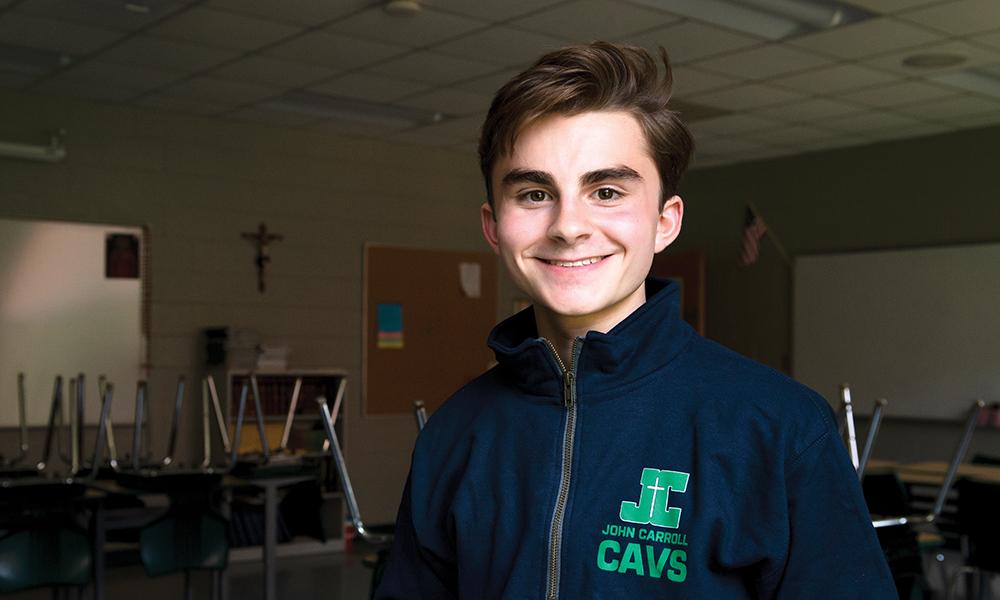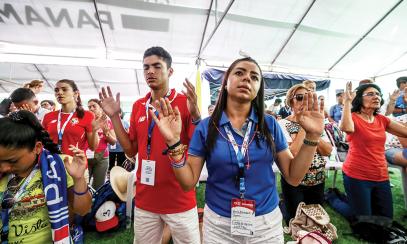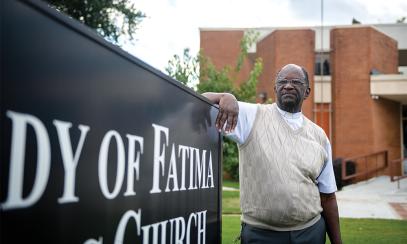
From Pride to Prayer
How a Young Man’s Witness is Making a Difference
How a Young Man’s Witness is Making a Difference
Listening to God is a challenge no matter how old you are, but the youth of today are bombarded by external distractions unlike those of any other generation. Some would say that they are a lost cause, but if Vince Truitt, a John Carroll Catholic High School student, is any indication, our youth are uniquely positioned to cultivate a deep faith — their own and the faith of those around them.
Listening to God is a challenge no matter how old you are, but the youth of today are bombarded by external distractions unlike those of any other generation. Some would say that they are a lost cause, but if Vince Truitt, a John Carroll Catholic High School student, is any indication, our youth are uniquely positioned to cultivate a deep faith — their own and the faith of those around them.
When Truitt was in junior high, those looking from the outside would have said his life was great: He attended a top-notch public school and excelled academically. “I was kind of prideful,” he remembers. However, he says his life was not exactly ideal; there was an emptiness. He often questioned his purpose and his desires. Compounding the void in his life were frequent feelings that he was at odds with his family and the world.
In August of Truitt’s eighth-grade year, the youth group at his parish, Our Lady of Sorrows Catholic Church (OLS) in Homewood, held an event that included eucharistic adoration. Although he had never been to any major youth group gathering, his mother encouraged him to go. In a show of support, his father, a non-Catholic, drove Truitt, his brother, and his mother to the OLS parking deck for an evening that would jumpstart Truitt’s faith journey.
For the first time in his life, he freely went to confession. He says he really didn’t tell the priest anything major, but the sacrament opened his heart to what happened next. As the young Truitt knelt before the Eucharistic Lord, the night sky behind the monstrance lit up with bolts of cloud-to-cloud lightning: for those present, the silence was deafening. “I didn’t even know what was happening. I didn’t know this was going to be the start to something,” he recalls.
That start took some time, however. Immediately after adoration, when Truitt got home, he got into a rather heated verbal exchange with his father, leaving him in tears and full of sadness. For the next month, he struggled with and experienced anger and frustration.
Being a teenager is much like being at a crossroads: You aren’t a little kid anymore, but you aren’t exactly an adult either. One day, he simply said to himself, “OK, I need to change.”
He put his God-given gifts to use and created a virtue document. He identified his sins and isolated what led to those sins. Not long after completing his chart, his feelings of anger started to decrease in frequency and a calm overtook Truitt.
In every aspect of his life, he had a new awareness. So much so that he even began to take a look at his friends and his school. He was part of a school community, just one that didn’t actively support or even understand his beliefs. “I tried to talk about God,” Truitt says. “I tried to talk about Catholicism, but no one had any idea what I was saying. I had to explain to people. There was this one kid that was pretty open. He called himself a stay-at-home Christian. I talked to him about the Eucharist a little bit, but he said he had never before heard the word Eucharist.” Truitt even had friends tell him, “No one here thinks like you,” encouraging him to find a school that “fit him better.” Looking back at his transition from public school to John Carroll Catholic, he affirms, “God literally picked me up and said, ‘Here you go.’” He admits it is hard to explain, but the new start opened a door for Truitt: He was given the opportunity to live out his faith confidently and openly.
Granted, as a John Carroll Cavalier, he doesn’t necessarily shout about his faith from the rafters, but instead of having to explain his faith to his classmates, he is now able to freely act out his faith. He makes trips to the chapel, prays the Rosary daily, and volunteers at parish events and apostolates such as Nazareth House, an apostolate for young people with intellectual disabilities. He brings God into whatever he is doing. Wishing someone a happy feast day or thanking God is commonplace for Truitt in the classroom. As can be expected, his example doesn’t go unnoticed.
While at dinner before the Queen of Hearts dance his freshman year, a group of seniors saw Truitt. One “big dude” came over and asked, “Are you the kid who always prays?” Once his presumption was affirmed, the senior politely and genuinely petitioned, “Pray for me.”
For youth, prayer is increasingly elusive in a world of constant distraction, but Truitt holds that prayer is simply “being with God.” “People think prayer is like a conversation, like saying, ‘God, I want this. Thank you, bye.’ But, in prayer all you have to do is give God yourself.” He says he was once told that prayer is like a phone that is “always off the hook.” “It’s like you're constantly in prayer. ... You need to be present in the moment, but you also need to have the line open for God. You want to share that moment with God, always saying something to Him and always having your ear open to listen to Him.”
Truitt, most certainly, lives his life with his “ear open” to God. He is a prime example of what can happen when, through grace, one becomes a witness to the truth of our faith. The youth of today are well-positioned, due to their unique set of circumstances, to enliven the Church with a vigor and zeal unlike any other in recent memory. “God has no grandkids,” Truitt exclaims. “Faith can’t just be passed on. You can’t pretend like it is already there. … God will provide the heat and the oxygen. All we have to do is provide the fuel.”



